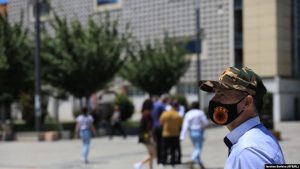Albi Çela and Pedro Pizano. Çela is an International Rule of Law and Security Program Fellow at the Sandra Day O’Connor College of Law at Arizona State University in Washington, D.C. Pizano is the Northwestern-McCain Public Interest Legal Fellow at ASU’s McCain Institute for International Leadership.

A law that purports to “protect the values” of the Kosovo Liberation Army (KLA) will soon be sent to the Parliament of Kosovo for consideration.
The law was initially proposed in April 2018. However, the law did not move forward due to then-Prime Minister Ramush Haradinaj’s indictment in The Hague and the election of Albin Kurti as Prime Minister. It was proposed once again in April 2020 by the Kosovo Democratic Party, which was founded by former KLA leader and incumbent President Hashim Thaçi. He is currently under investigation by the Kosovo Specialist Chamber and Specialist Prosecutor’s Office for war crimes and crimes against humanity allegedly committed during and after the 1998-99 war in Kosovo.
On July 14, while Thaçi was being was being questioned in The Hague, the Government of Kosovo, led by the Democratic Movement of Kosovo party, agreed to forward the law to Parliament. The other major parties had already agreed to adopt the law in its current form.
The draft law imposes an institutional and individual obligation to “protect the values” of the KLA, which include the KLA itself as an armed military formation, its veterans, flag, soldier’s oath, coat of arms, the General Staff, Political Directorate, staffs of operational areas and archives, as well as the Adem Jashari Memorial Complex in Prekaz, and other memorial complexes.
What makes this draft law worrisome is the chilling effect that it would have on freedom of speech. If adopted, anyone who speaks against the KLA could face retribution.
On Friday, August 7, the U.S. Ambassador to Kosovo, Philip S. Kosnett, expressed his concern about the effects of the proposed law on “Kosovo’s democracy” and “the chilling effect on free speech.” He emphasized that it would “intimidate citizens” and that “many citizens had told the Embassy they already felt uneasy speaking publicly about the law.” Kosnett also highlighted the fact that citizens would feel much more intimidated “if the law passes.” The Swiss, German, and E.U. missions expressed similar concerns.
Serbian President Aleksandar Vučić, on the other hand, considered that the law sought to intimidate Serbs in Kosovo specifically. He communicated this to the E.U. envoy for dialogue between Kosovo and Serbia, Miroslav Lajčák.
Most major political parties in Kosovo, however, support the law. These include the Alliance for the Future of Kosovo party of former Prime Minister and KLA veteran Ramush Haradinaj. The sole exception is the Vetevendosje Party of former Prime Minister Albin Kurti.
Rexhep Selimi, the head of the Vetevendosje parliamentary group, stated that the law in its current form is not appropriate, and that Vetevendosje will address its objections in parliament. However, he emphasized that his party does not oppose a law that protects the purported values of the KLA.
The proposal of this draft law comes at a critical time for the future of Kosovo and its people. Kosovo is currently negotiating with Serbia to normalize relations under the supervision of the European Union and this law might be another obstacle in reaching a final agreement. Additionally, with Thaçi, former KLA leader and former Chairman of the Assembly of Kosovo Kadri Veseli, and other KLA veterans facing serious war crime allegations, the draft law appears to be an attempt to undermine the work of the Kosovo Specialist Chambers and Specialist Prosecutor’s Office for War Crimes and Crimes Against Humanity, and increase nationalistic feelings among Kosovars.
The law has already backfired: If the KLA is so honorable, why does it need the force of law to preserve its reputation? Why can it not stand on its mostly honorable history and the memory and lived experiences of its citizens? The more they try to censor its reputation into honor, the more dishonor it will being.
The indicted sitting President of Kosovo, Hashim Thaçi, has voluntarily testified to an American prosecutor together with his American lawyer. Why can Thaçi and his party not let the history—the full history, in as much as it is possible—of the KLA stand on its own two feet?
Only then will the 30-plus years of national and international efforts to achieve meaningful peace and justice in the Balkans totter forward.